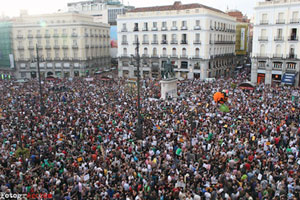Protesters tell Spanish gov’t: ‘No bread, no peace!’
By
John Catalinotto
Published May 21, 2012 9:31 PM
|
Madrid’s
Puerta del Sol,
May 12.
Photo: Fotograction
|
One year after the “indignant ones” began their struggle to undermine the Spanish state, mass marches protested the attack of the 1% on the people and tried to take back the public space they had been forced to cede. Police again arrested dozens to deny public assemblies to workers, unemployed youths and seniors, all deprived of their futures.
The movement’s persistence indicates a “re-politicization” of youth. The corporate media’s current charges that this movement has been taken over by extreme leftists are undoubtedly exaggerated. Still, these charges reflect the Spanish ruling class’s fears of a new upsurge of struggle that will break the confines of establishment institutions like parliament and business unionism.
Organizers said hundreds of thousands filled streets and squares in nearly 100 cities and towns on May 12. Solidarity “12M15M” protests took place in another 200 cities in Europe, and in Africa, South and Central America, and even in the U.S. and Canada.
The largest assemblies were in Madrid’s Puerta del Sol central square and Barcelona’s Plaza Catalunya. In Madrid, after activists held all-night discussions, police forced the remaining thousands out early in the morning, arresting 12. In all participating cities, police refused demonstrators their right to a public, democratic meeting space.
Slogans popularized by the crowds reflected the drastic economic downturn for workers in Spain, especially for youth. Some of the ones seen in photos or chanted on videos were, “No layoffs, no evictions!” and “No bread, no peace!”
Despite differences in class-struggle history between Spain and the U.S., there are enough similarities in the current developments that each working class can learn from the other’s experiences.
Struggle opened May 15, 2011
The Tunisian and Egyptian uprisings 17 months ago inspired the Indignant movement of youth already suffering from the capitalist economic crisis. Surprising nearly everyone, the indignant ones seized Puerta del Sol in Madrid and Plaza Catalunya in Barcelona on May 15, 2011, holding on to them for weeks.
Thousands then filled not only these plazas, but also many more public spaces in dozens of cities throughout the country. Initially, the corporate media were friendly to the protests. As it became apparent that the open assemblies were turning into centers that could generate real struggle, the media began demonizing the protesters and the police attacked.
The process was similar to that of the Occupy movement in the United States.
At the same time that workers’ conditions plunged in the U.S. starting in 2008, they dropped off a cliff in Spain. Current official unemployment is 23 percent overall there, 50 percent for young people. Meanwhile, the regime has promoted laws stripping workers of protections against layoffs and cutting pensions, health care and education.
There are 175 home evictions daily. This reflects the housing bubble’s deflation in 2008 after a decade of credit-driven expansion.
Both the previous “Socialist” (PSOE) government and the current center-right (PP) regime have promoted austerity and submission to the European bankers’ demands.
Federal leaders in the two major trade union confederations (CCOO and UGT) had made compromises with the PSOE regime that conceded many rights. Thus, these unions — at least on a federal level — have lost credibility as fighting forces. Young people look to the smaller, more grass-roots unions like the Cobas or the CGT.
In regions with a strong consciousness of national oppression — such as the Basque Country in the northeast and Galicia in the northwest — the local unions have maintained their struggle reputation with strong general strikes.
On May 15, the movement plans to once again attempt to take back public space. They need this for democratic discussion on what to do next to confront what more and more people are beginning to realize is an unresolvable capitalist crisis.
Articles copyright 1995-2012 Workers World.
Verbatim copying and distribution of this entire article is permitted in any medium without royalty provided this notice is preserved.
Workers World, 55 W. 17 St., NY, NY 10011
Email:
[email protected]
Subscribe
[email protected]
Support independent news
DONATE


